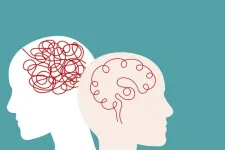(Press-News.org) MINNEAPOLIS – When taken at the first signs of a migraine, before headache pain begins, a drug called ubrogepant may be effective in helping people with migraine go about their daily lives with little or no symptoms, according to a new study published in the August 28, 2024, online issue of Neurology®, the medical journal of the American Academy of Neurology. The study focused on people with migraine who could tell when an attack was about to happen, due to early symptoms such as sensitivity to light and sound, fatigue, neck pain or stiffness, or dizziness.
Ubrogepant is a calcitonin gene-related peptide receptor antagonist, or CGRP inhibitor. CGRP is a protein that plays a key role in the migraine process.
“Migraine is one of the most prevalent diseases worldwide, yet so many people who suffer from this condition do not receive treatment or report that they are not satisfied with their treatment,” said study author Richard B. Lipton, MD, of Albert Einstein College of Medicine in Bronx, New York, and Fellow of the American Academy of Neurology. “Improving care at the first signs of migraine, even before headache pain begins, can be a key to improved outcomes. Our findings are encouraging, suggesting that ubrogepant may help people with migraine function normally and go about their day.”
The study involved 518 participants who had migraine for at least one year and two to eight migraine attacks per month in the three months before the study. All of the participants regularly experienced signs that a migraine would be starting within the next few hours. Participants were asked to treat two attacks during a two-month period.
Researchers divided participants into two groups. The first group received a placebo for their first set of pre-headache symptoms of migraine, followed by taking 100 milligrams (mg) of ubrogepant for their second instance of symptoms. The second group took ubrogepant for the first instance and placebo for the second instance.
Participants evaluated limitations on their activity in their diary using a scale ranging from zero to five, with 0 meaning “not at all limited – I could do everything”; 1, “a little limited”; 2, “somewhat limited”; 3, “very limited”; or 4, “extremely limited.”
Twenty-four hours after taking the drug or a placebo, 65% of people who took ubrogepant reported themselves as “not at all limited – I could do everything,” or “a little limited,” compared to 48% of those who took the placebo.
Researchers found that as early as two hours post-medication, people who took the drug were 73% more likely to report that they had “no disability, able to function normally,” than those who took the placebo.
“Based on our findings, treatment with ubrogepant may allow people with migraine who experience early warning signs before a migraine occurs to quickly treat migraine attacks in their earliest stages and go about their daily lives with little discomfort and disruption,” said Lipton. “This could lead to an improved quality of life for those living with migraine.”
Lipton noted that participants showed that based on their headache warning symptoms, they could reliably predict impending migraine headaches. These findings apply only to those with reliable warning symptoms.
A limitation of the study was that participants recorded their symptoms and medication use in electronic diaries, so it is possible some people may not have recorded all information accurately.
The study was funded by AbbVie, the maker of ubrogepant.
Learn more about migraine at BrainandLife.org, home of the American Academy of Neurology’s free patient and caregiver magazine focused on the intersection of neurologic disease and brain health. Follow Brain & Life® on Facebook, X and Instagram.
When posting to social media channels about this research, we encourage you to use the hashtags #Neurology and #AANscience.
The American Academy of Neurology is the world's largest association of neurologists and neuroscience professionals, with over 40,000 members. The AAN’s mission is to enhance member career fulfillment and promote brain health for all. A neurologist is a doctor with specialized training in diagnosing, treating and managing disorders of the brain and nervous system such as Alzheimer's disease, stroke, concussion, epilepsy, Parkinson's disease, multiple sclerosis, headache and migraine.
For more information about the American Academy of Neurology, visit AAN.com or find us on Facebook, X, Instagram, LinkedIn and YouTube.
END
New study: drug may stop migraines before headache starts
2024-08-28
ELSE PRESS RELEASES FROM THIS DATE:
Using high resolution mass spectrometry to study fuel chemistry
2024-08-28
WASHINGTON – U.S. Naval Research Laboratory researcher Mark Romanczyk, Ph.D., developed new analytical methods to rapidly analyze fuels and complex petroleum products by using high-resolution mass spectrometry.
The approaches Romanczyk utilizes enable highly detailed qualitative analysis of complex mixtures in minutes. One recent method facilitated the investigation of chemical changes that occurred in weathered crude oil in terrestrial environments. Several of the methods were recently published in the ...
Dartmouth’s Geisel School of Medicine to launch new online Master’s Degree program in Implementation Science
2024-08-28
Preview blurb: Geisel’s new fully online 9-month MS in Implementation Science will give graduates the skills to identify and address gaps in moving evidence-based clinical practices into routine use in the real world.
HANOVER, NH - “How can we more quickly and effectively move new, proven scientific evidence into routine healthcare practice? What obstacles must be overcome to embrace change and modify behavior? How can we scale a successful intervention so that more people will benefit?”
These are some of the key questions future students will learn to tackle as enrollees ...
Houston Methodist and Rice University Center for Neural Systems Restoration Inaugural Fall Symposium
2024-08-28
World-renowned physicians and scientists will gather at the Houston Methodist Research Institute September 17-18 to discuss pioneering research discoveries and technologies in neuroscience that have the potential to transform the field and evolve into innovative treatments for neurological disorders of all kinds.
Hosted by the Houston Methodist and Rice University Center for Neural Systems Restoration, the symposium brings together experts in the field of neural circuits, neural technology and neuro-restoration. Twenty-four speakers will highlight the ...
Making waves in hurricane prediction
2024-08-28
More accurately predicting periods of increased hurricane activity weeks in advance may become possible due to new research published this month.
The study, led by the U.S. National Science Foundation National Center for Atmospheric Research (NSF NCAR), shows that twice as many hurricanes form two days after the passing of large-scale atmospheric waves called Kelvin waves than in the days before. This finding may enable forecasters and emergency managers to anticipate clusters of hurricanes days to weeks in advance.
The research team used an innovative ...
Autistic traits, behavioral problems in 7-year-olds linked with gender nonconforming play
2024-08-28
Gender nonconformity in 7-year-olds — as measured by levels of gender-conforming play — may be associated with autistic traits and behavioral difficulties in girls, and with peer relationship problems in boys, according to a new study published August 28, 2024 in the open-access journal PLOS ONE by Marlene Stratmann of Karlstad University, Sweden, and colleagues.
Gender nonconformity (GNC) refers to variations in gender expression from societal and cultural gender norms. In childhood, GNC can manifest itself in several ways, including play behavior, peer relationships, clothing, and body language. Childhood GNC does not directly indicate developing gender ...
Geographic differences in US homicide rates have decreased since the 1970s
2024-08-28
A new study finds that, counter to expectations, geographic disparities in rates of homicides in the US have decreased in recent decades. Richard Boylan of Rice University in Houston, Texas, US, presents these findings in the open-access journal PLOS ONE on August 28, 2024.
Since the 1970s, gaps in economic and social wellbeing between Americans living in different regions have grown. Some researchers hypothesize that areas with reduced economic and social well-being would see higher rates of violent crime. For instance, impoverished areas with lower tax bases might receive less police protection, ...
Lackluster prioritization of the health sector in government spending and dwindling donor contributions drive slow growth in health spending in Sub-Saharan Africa
2024-08-28
Slow growth in health sector spending is projected in Sub-Saharan Africa as reported in a study published in the open access journal, PLOS Global Public Health. The decline is expected to continue to 2050, according to Angela E Apeagyei and researchers at the Institute for Health Metrics and Evaluation, University of Washington, Seattle, and is driven by tepid growth in the share of government spending that is allocated to health and reductions in development assistance for health.
The research analyses data from databases covering development assistance for health, global health spending and gross domestic spending (GDP) per capita ...
People experiencing relatively mild cases of mental ill-health may be perceived differently by others depending on whether or not diagnostic labels are provided
2024-08-28
Diagnostic labels for people experiencing what some consider to be relatively milder forms of mental-ill health may affect how others perceive them for better and worse, according to a study published August 28, 2024 in the open-access journal PLOS Mental Health by Nick Haslam from the University of Melbourne, Australia, and colleagues.
In recent years, there’s been a general shift to increased diagnoses of mental ill-health. Here, Haslam and colleagues investigate the implications of diagnosing individuals presenting with ...
Unhealthy commodities—like alcohol and social media—are connected with poor mental health
2024-08-28
“Unhealthy commodities” such as tobacco, alcohol, ultra-processed foods, social media, and fossil fuels, as well as impacts of fossil fuel consumption such as climate change and air pollution are associated with depression, suicide, and self-harm, according to a study published August 28 by Kate Dun-Campbell from the London School of Hygiene & Tropical Medicine, and colleagues.
Globally, around one out of every eight people currently live with a mental health disorder. These disorders—including depression, suicide, anxiety, and other diseases and disorders—can have many underlying causes. ...
Bacterial cells transmit memories to offspring
2024-08-28
Bacterial cells can “remember” brief, temporary changes to their bodies and immediate surroundings, a new Northwestern University and University of Texas-Southwestern study has found.
And, although these changes are not encoded in the cell’s genetics, the cell still passes memories of them to its offspring — for multiple generations.
Not only does this discovery challenge long-held assumptions of how the simplest organisms transmit and inherit physical traits, it also could be leveraged for new medical applications. For example, researchers could circumvent antibiotic resistance by subtly tweaking a pathogenic ...







